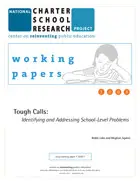Of all elements of charter school oversight, performance monitoring perhaps best highlights the tensions in managing a decentralized system of schools. While charter authorizers have consciously sought to avoid district practices that emphasize process at the expense of outcomes and that are costly for individual schools and authorizers alike, they nonetheless want schools to succeed, and have a public responsibility to protect children. Furthermore, performance monitoring is new to public education; thus, charter authorizers have few models to follow.
Based on extended interviews with a select number of charter school authorizers and a review of private management literature, this working paper summarizes common problems faced by new and established charter schools and highlights strategies to diagnose and, when appropriate, intervene in struggling schools. It concludes by proposing a tiered approach that personalizes oversight mechanisms to individual schools and targets monitoring resources where they are most needed.





